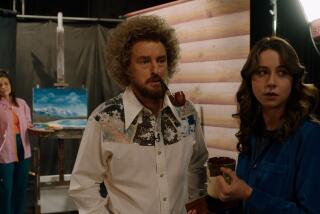Picasso, Einstein and genius’ nature
- Share via
Scientists and artists may seem worlds apart, but in his deceptively breezy 1993 hit, “Picasso at the Lapin Agile,” writer-actor-comic Steve Martin looked past their surface differences in search of more fundamental common ground. Rubicon Theatre Company’s smart, spirited revival wraps passionate philosophical inquiry in the entertaining, accessible gauze of Martin’s giddy comic salute to the artistic, intellectual and cultural accomplishments of the 20th century.
Rather than simply describing the world as it is, true genius lies in creating a new way of looking at the world, proclaims a young Albert Einstein (Jamie Torcellini) in the course of a fictitious but fruitful encounter with Pablo Picasso (Paul Provenza). The setting is a Parisian bar in 1904; Picasso’s career has just begun to take off, Einstein is still a patent office clerk, his theory of relativity a year away from publication. Torcellini’s affable, quietly subversive Einstein anchors the piece, nicely complementing the flamboyant, cocky artiste that Provenza perfected in the play’s New York run and national tour.
Amid a loopy parade of colorful watering hole regulars and the riot of puns, gags and recurring punch lines that are Martin’s forte, the painter and the physicist eventually square off in a hilarious shootout fought with pen and paper. The results -- a drawing and a formula -- are the respective idioms through which each will change the world in the century ahead. Director William Keeler infuses their competition with unabashed enthusiasm for the world of ideas, as combatants come to recognize the common goals of meaning and beauty that underlie their pursuits.
The core of Martin’s unified field theory of genius lies in seeing new connections between previously unrelated elements. In science, the connection is literal, in art it’s metaphorical -- hence Einstein’s groundbreaking equation of matter and energy played against Picasso’s poetic yearning to reveal “the thousand years of tenderness in a woman combing her hair.”
Following the theoretical model of creativity popularized in the 1970s by the late Arthur Koestler, the play embodies the third component in the creative triptych -- humor -- in the classic Martin-esque character of Schmendiman, a clueless, self-absorbed inventor (played with scene-stealing pomposity by Joseph Fuqua).
Martin’s writing is celebratory, thoughtful, witty and, at times, dazzling, but while his principal characters are historically and thematically weighty, there isn’t all that much at stake for them here. The only scene with real heft is a perfectly played exchange in which the savvy barmaid (Nancy Nufer) dissects the insecurities in Picasso’s compulsive womanizing.
Otherwise, Martin sticks with feelings of wonder and delight that culminate in magic realism -- the surprise appearance of a certain time-traveling entertainer (Cyrus Alexander) whose popularity will one day eclipse both Picasso’s and Einstein’s. Limited emotional palette notwithstanding, the play’s forward-looking meditations on the creative possibilities that beckoned at the turn of one new century feel right in sync at the dawn of another.
--
‘Picasso at the Lapin Agile’
Where: Rubicon Theatre, 1006 E. Main St., Ventura
When: 2 and 7 p.m. Wednesdays, 8 p.m. Thursdays and Fridays, 2 and 8 p.m. Saturdays, 2 p.m. Sundays
Ends: April 27
Price: $29 to $52
Contact: (805) 667-2900
Running time: 1 hour, 25 minutes
More to Read
The biggest entertainment stories
Get our big stories about Hollywood, film, television, music, arts, culture and more right in your inbox as soon as they publish.
You may occasionally receive promotional content from the Los Angeles Times.










